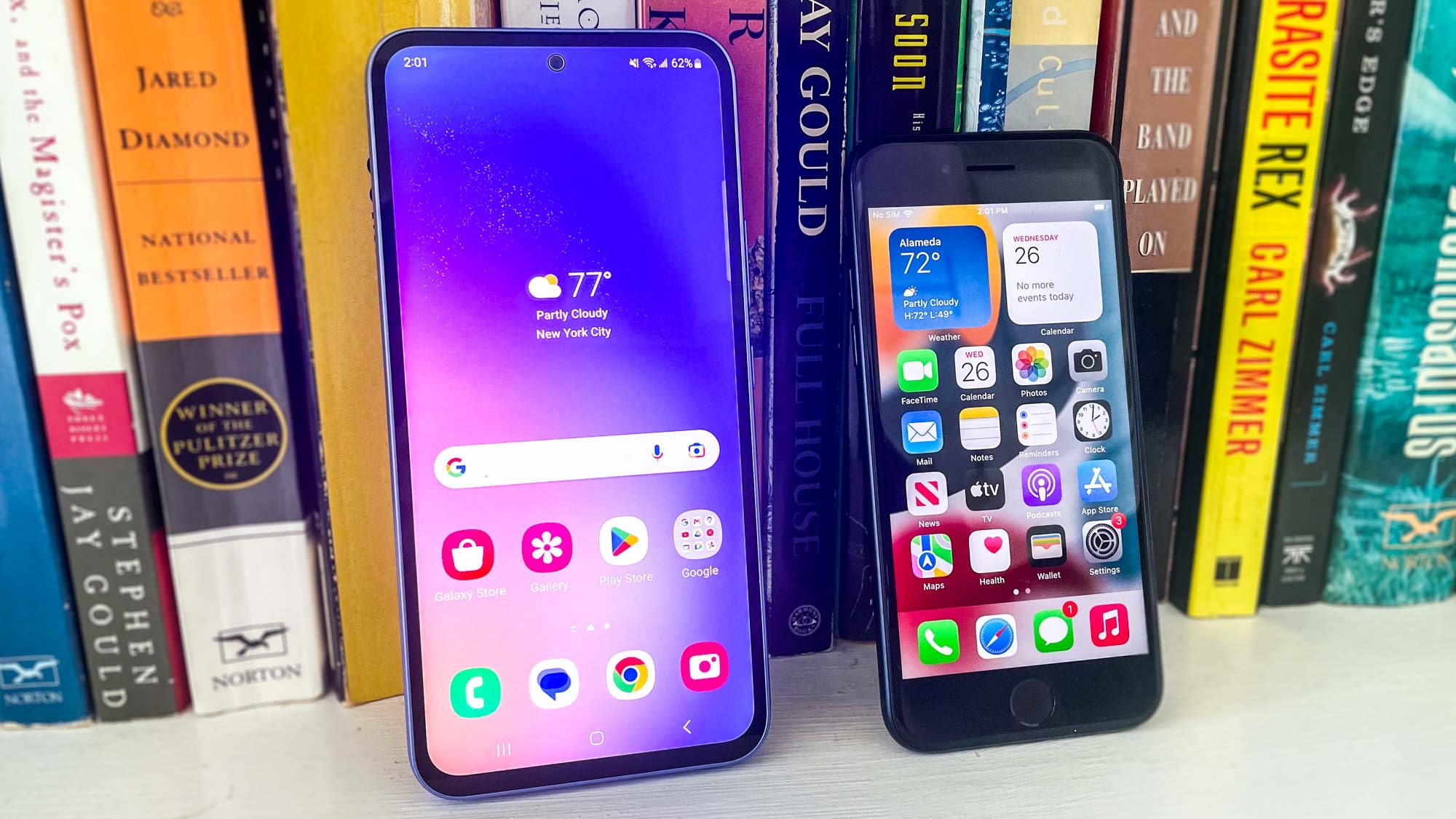
The Samsung Galaxy A54 is one of the best cheap phones you can buy, thanks to an excellent main camera, a bright 6.4-inch screen and a battery that lasts. While its processor is not as powerful as the A15 Bionic, this is the superior phone in nearly every other way.
For
- Improved 50MP main camera
- Excellent shots in low light
- Bright, colorful display
Against
- No wireless charging
- Only modest performance gains from predecessor
It may have just one rear camera, but the iPhone SE's photos compare well to the ones shot by the Galaxy A54. Apple's phone is also the clear performance leader. But that 2018-era design is really showing its age, and the LCD panel doesn't match a fast-refreshing OLED screen.
For
- Fastest performance for the money
- Very good photo quality
- Compact phone
Against
- Small display with big bezels
- No Night mode for camera
Samsung and Apple's battle for smartphone bragging rights moves into budget devices with a Samsung Galaxy A54 vs. iPhone SE face-off. While the phone makers may be better known for their pricey flagships, each one also has a sub-$500 phone aimed at appealing to shoppers on tighter budgets.
The Galaxy A54 is the newer of the two midrange models, arriving this year with an improved main camera, a brighter 6.4-inch display and a longer lasting battery. It's also adopted the look of the Galaxy S23 series, even if it skimps on a few other features in order to keep costs down.
The iPhone SE (2022) came out last spring, but don't let its age fool you. It's still a top-performing phone, thanks to the same A15 Bionic chip that debuted with the iPhone 13. And it benefits from Apple's mobile software to deliver a great iPhone experience in a much cheaper package.
A Samsung Galaxy A54 vs. iPhone SE comparison likely boils down to which mobile platform you prefer — Android or iOS. But it's still worth looking at which device delivers more value as the best cheap phone overall. Here's how the two phones compare.
Samsung Galaxy A54 vs. iPhone SE specs
Samsung Galaxy A54 vs. iPhone SE price
You'll spend less on the base model of the iPhone SE. Apple charges $429 for its cheapest iPhone, which is $20 less than the Galaxy A54's price.
But not all base models are created equal. The Galaxy A54 features 128GB of storage (U.K. shoppers can opt for a 256GB version), which is double the amount of storage that comes with the $429 iPhone. To get an equal amount of storage, you'd have to pay another $50, which makes the 128GB iPhone SE $30 more expensive than the A54.
You can try to lower the price of both phones by looking for the best Galaxy A54 deals and the best iPhone SE deals.
Despite the iPhone's lower starting price, we have to give the edge to the Galaxy A54 for delivering better value with its 128GB of storage.
Winner: Samsung Galaxy A54
Samsung Galaxy A54 vs. iPhone SE design
The Galaxy A54 takes its inspiration from a flagship phone, mirroring the look of the Galaxy S23. That means the rear cameras descend in a vertical row down the back of the phone, with the lenses protruding out the back. This actually makes the Galaxy A54 wobble a little when you set it down face-up — a problem the iPhone SE doesn't have since its one camera lens doesn't stick out as much.

The iPhone SE takes its inspiration from a flagship phone, too. Unfortunately, that flagship came out in 2018. The iPhone SE retains the iPhone 8's design, which means it still has a Touch ID button, but also chunky bezels on the top and bottom of the screen. The Galaxy A54's bezels are noticeable in their own right, but nowhere near as prominent as what iPhone SE owners have to contend with.
Both phones use cheaper materials than their flagship counterparts, but both offer some measure of durability with IP67 water resistance ratings. That means either the iPhone SE or Galaxy A54 can survive a dip in up to 1 meter of water for 30 minutes.
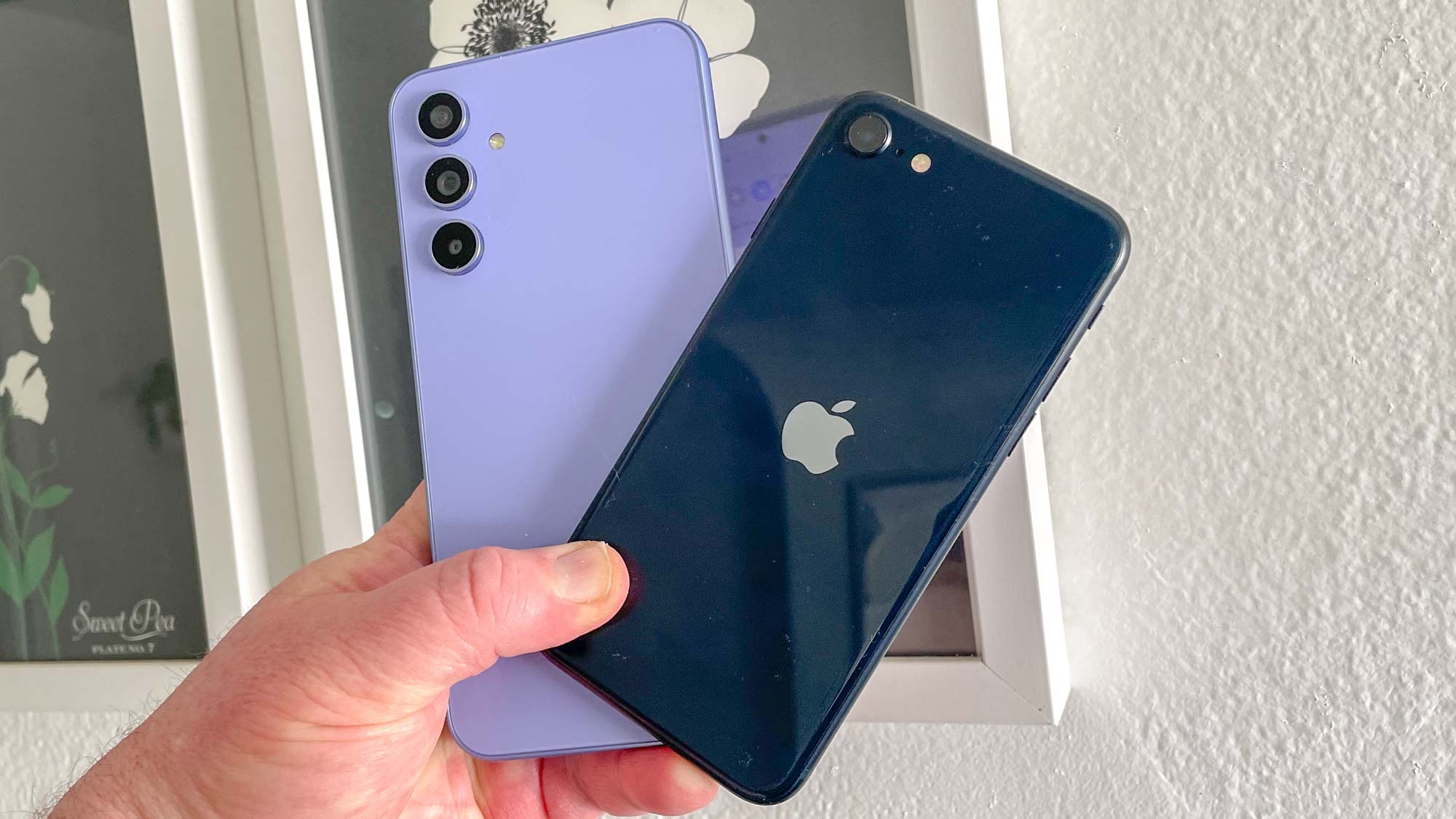
You'll get more colorful options with the Galaxy A54, which features violet and lime colors alongside the usual black and white. The iPhone SE only offers a [Product] Red version alongside its white and black options.
Winner: Samsung Galaxy A54
Samsung Galaxy A54 vs. iPhone SE display
The differences between the displays on the Galaxy A54 and iPhone SE are apparent from the moment you look at both phones. The Galaxy A54 offers ample screen real estate with a 6.4-inch display, while the iPhone SE's 4.7-inch panel is among the most compact still available.

The differences go deeper as you dive into the specs, though. Samsung uses an OLED panel for the Galaxy A54, while Apple equips the iPhone SE with an LCD screen. That means truer blacks on the A54's display, which also benefits from a 120Hz refresh rate. The iPhone SE is locked at 60Hz.
In its Natural setting, the Galaxy A54 recreates slightly more colors than the iPhone SE for both the sRGB and DCI-P3 color gamuts, and its colors are more accurate based on the A54's 0.06 Delta-E rating. (The closer to zero, the more accurate the colors.) Samsung's phone is brighter, too, registering 854 nits on a light meter versus 590 nits for the iPhone SE.
Winner: Samsung Galaxy A54
Samsung Galaxy A54 vs. iPhone SE cameras
When it comes to camera hardware, the Galaxy A54 seemingly has the iPhone SE beat, with three lenses to just a single rear camera on the Apple phone. Of course, one of the A54's cameras is a fairly superfluous macro lens, so really we're just concentrating on the 50MP main camera and the 12MP ultrawide shooter. It's the 50MP sensor that should draw the most attention, as it's the same main camera used by the Galaxy S23.
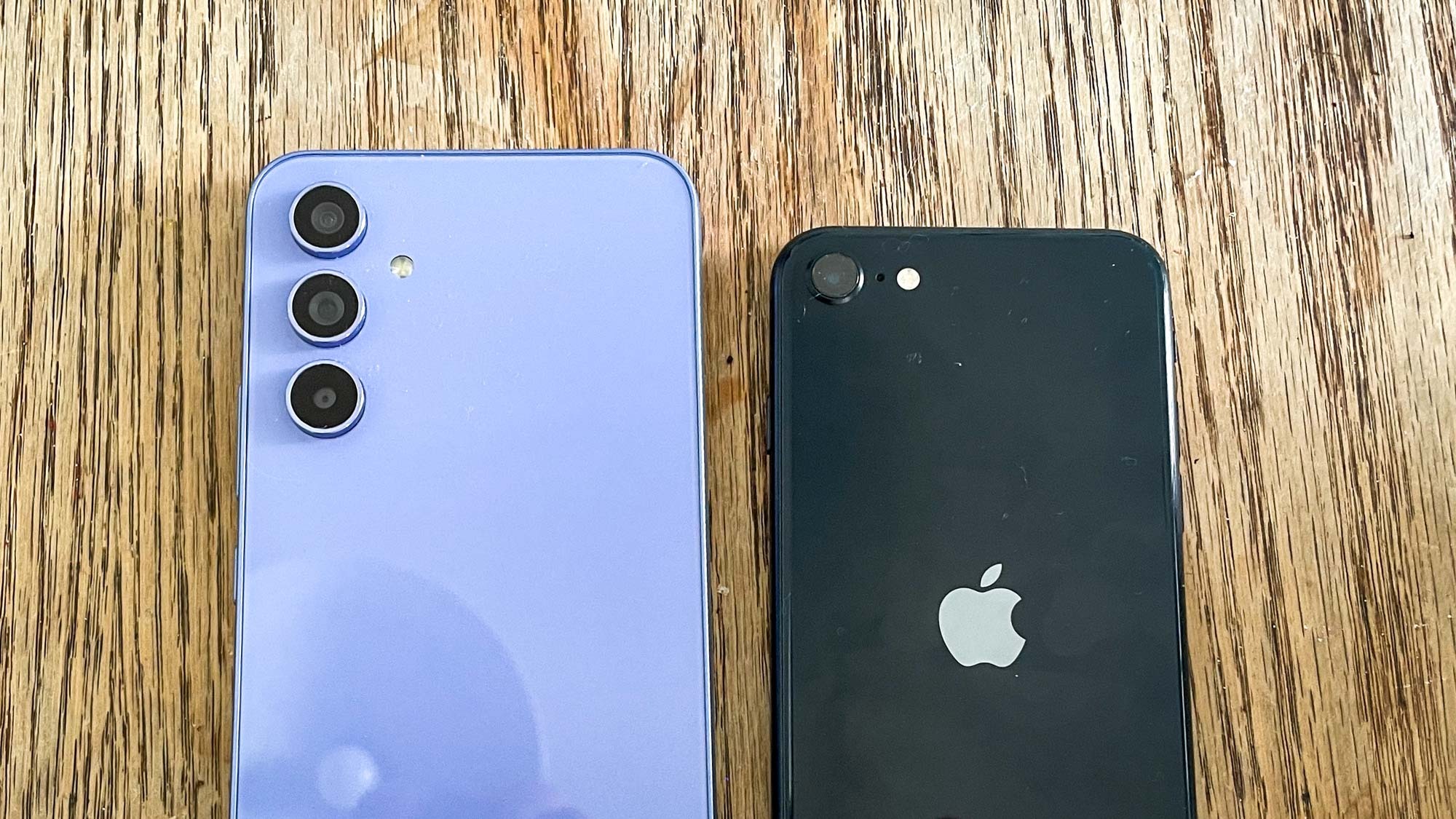
The iPhone SE has just one 12MP lens. There's no ultrawide shooter to compete with the Galaxy A54. Even more damning, the iPhone SE doesn't offer a Night mode, so the Galaxy A54 trumps it once the sun goes down. At least the iPhone SE benefits from the computational photography features supported by its A15 Bionic chipset, which should make for a pretty fair fight with the Galaxy A54.
We get a sense of how the photo processing powers of the iPhone SE help compensate for its lower resolution in this photo of a California lilac bush. The iPhone has pumped up the colors on the flowers to a very vibrant purple, which stands out more than the realistic-if-muted colors in the Galaxy A54 shot. The sky is a richer shade of blue in the iPhone SE shot, too, even if Apple's photo has more shadowy areas than the well-balanced A54 photo.
Likewise, the iPhone SE does a better job at compensating for some tricky sunlight in this fruit stand photo. There's some over-exposure going on in the Galaxy A54 photo, with certain squashes and melons looking particularly washed-out. You don't have that problem in the iPhone SE photo, where the glare off the fruits and vegetables is more subdued.
Another challenging lighting situation allows the Galaxy A54 to show off why its bigger sensor is better in some circumstances. These breakfast tacos were backlit by sunlight streaming in from a window behind the table. The bigger snesor on the Galaxy A54 takes in more light than the 12MP iPhone SE main camera, and as a result, we see more details in the scrambled eggs, including various chopped vegetables. Colors are brighter in the Galaxy A54 photo, too.
The iPhone's photo processing once again comes to the fore in portrait mode. It's a much warmer shot than what the Galaxy A54 manages. As a result, Samsung's phones makes my daughter look rather pale. The bokeh effect is more consistently applied in the iPhone's shot as well.
Turning to the 32MP front camera on the Galaxy A54 and the 7MP front camera on the iPhone SE, the self-portraits of me captured by both devices look evenly matched. If I had to pick,, I'd go with the Galaxy A54, where my skin tone looks the most natural. The iPhone made my face look a little more ruddy than it should, and my hair isn't as dark as it's depicted in the SE shot. I do think the background details in the iPhone selfie look a tad sharper, though.
These samples show that the iPhone SE can hold its own when the lighting's right and you just need a main camera. I think the Galaxy A54 offers a more flexible camera experience, though, thanks to its ultrawide lens and its ability to capture night shots. (See our Galaxy A54 vs. Pixel 6a camera face-off to see how well the A54's camera perform at night.)
To illustrate the limitations of the iPhone SE, I went down to my basement to shoot a photo of some Halloween decorations, with only sunlight streaming in from a door to provide any ambient lighting. The Galaxy A54 picture isn't the greatest, but at least you can see that there are two skeletons there, along with some other details in the room. Most of that's lost in shadows in the iPhone SE's shot since there's no Night mode to come to the rescue.

I don't have an iPhone SE ultrawide shot to compare it to — just one camera, remember — but here's what the Galaxy A54's ultrawide camera can pull off. There's plenty of color in the photo of a pizza parlor entrance, particularly in the blue sky and brown brickwork. There's also a noticeable fisheye effect to the shot, something i'll blame on the wide field of view for the ultrawide lens on the A54.
Winner: Samsung Galaxy A54
Samsung Galaxy A54 vs. iPhone SE performance
There's not much of a contest here. Apple equips the iPhone SE with one of its better chipsets, the A15 Bionic. That's not the version powering the iPhone 14 — that one has an extra GPU core — but it's still a plenty powerful piece of silicon.
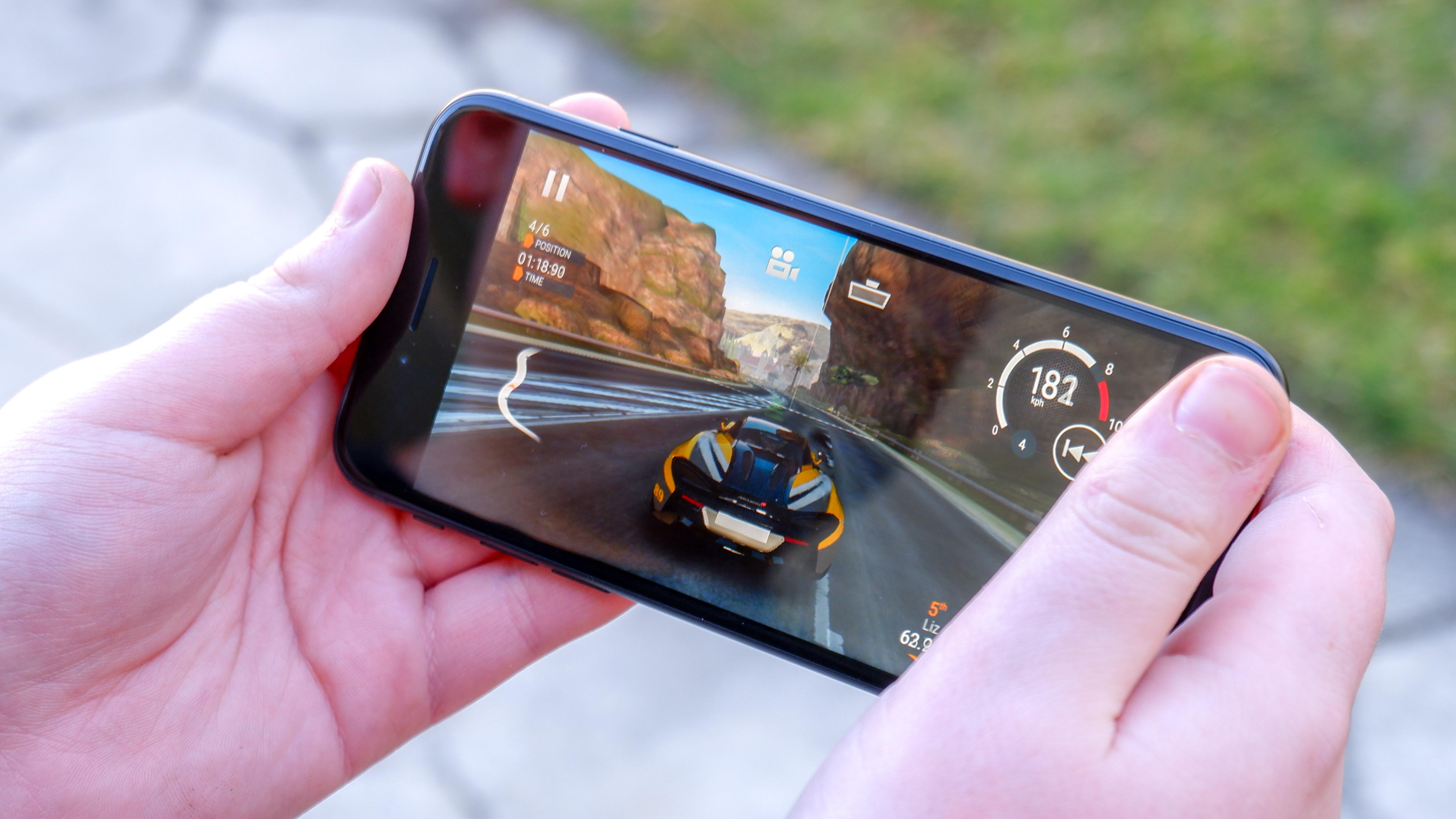
In contrast, Samsung has turned to the Exynos 1380 to run the Galaxy A54. That chip's supposed to deliver a 20% boost to CPU performance and 26% improvement to the GPU from what the Exynos 1280 was capable of, but that would still put Samsung's chipset well behind the A15 Bionic.
Indeed, that's what panned out when we ran benchmarks on both phones. The iPhone SE's Geekbench 5 scores of 1,178 on the single-core test and 4,482 on the multicore test handily beat the Galaxy A54's respective results of 781 and 2,664. Likewise, on the 3DMark Wild Life Unlimited graphics test, the iPhone SE produced a 50 frames per second result, compared to 16.9 fps for the A54.
Beyond synthetic benchmarks, the iPhone SE also races past the Galaxy A54 in real-world testing. We have phones transcode a video using Adobe Premiere Rush, and the iPhone SE completed that task in just 27 seconds. That's 44 seconds faster than the Galaxy A54's time.
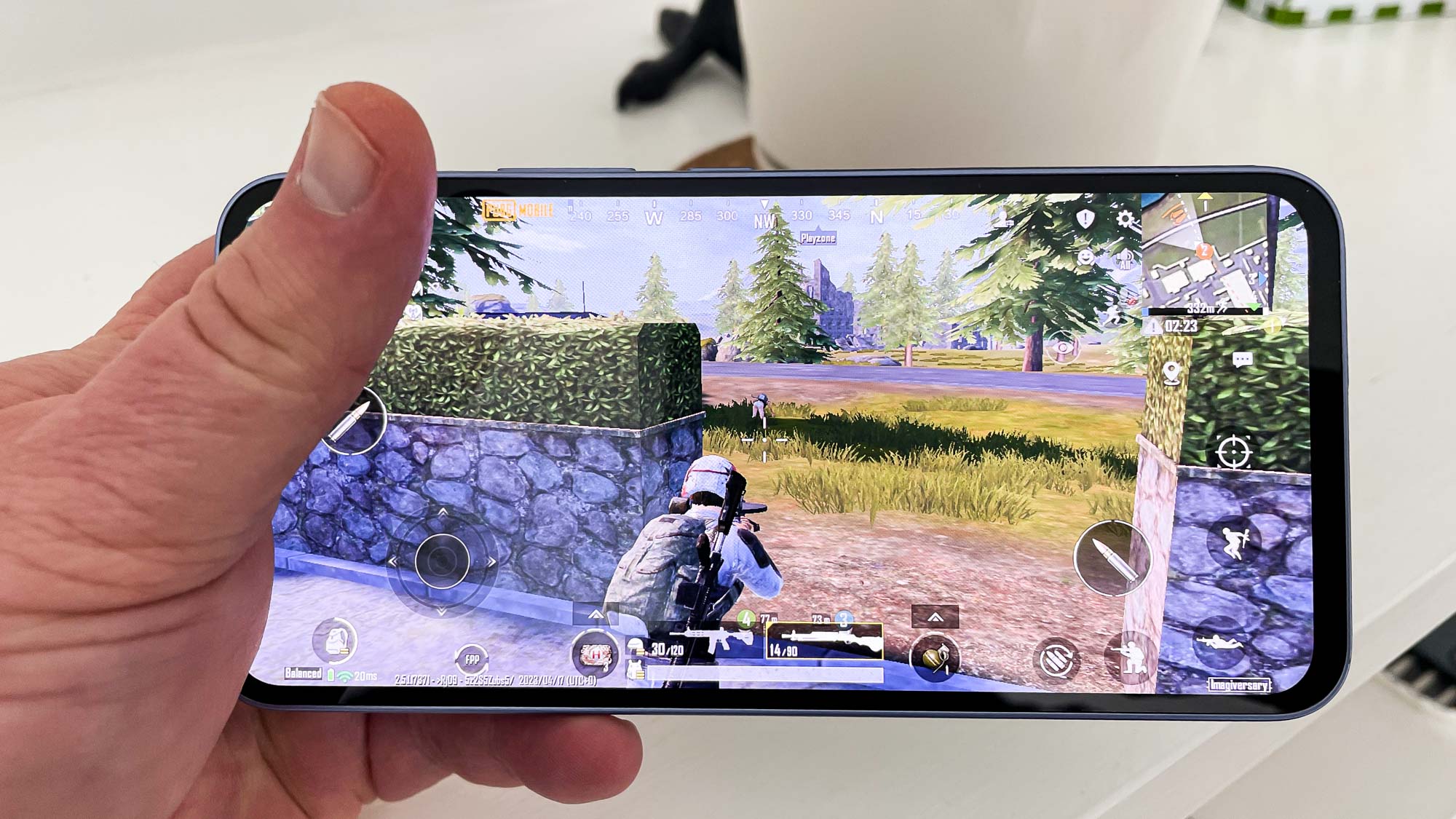
No matter how you slice it, if you want the faster phone, you have to pick the iPhone SE over the Galaxy A54.
Winner: iPhone SE
Samsung Galaxy A54 vs. iPhone SE battery life and charging
Faster though the A15 Bionic may be, it really doesn't help the iPhone SE manage the power from its 1,624 mAh battery. (Apple doesn't announce battery sizes for its phones — that number is based on an iPhone SE teardown.) On our battery test, in which we have phones surf the web over cellular until they run out of power, the iPhone Se lated 9 hours and 5 minutes. That's 50 minutes or so less than the average smartphone.
It's also less than the Galaxy A54's result. Benefitting from a 5,000 mAh battery, the Galaxy A54 lasted 10 hours and 20 minutes on our test. Disable the 120Hz refresh rate, and you get even better battery life, as the Galaxy A54 lasted 11 hours and 46 minutes with its display locked at 60Hz. That allowed the Galaxy A54 to sneak onto our best phone battery life list.
Neither phone offers blazing fast charging speeds. The iPhone SE can charge at 20W while the Galaxy A54 offers 25W charging. You are able to wirelessly charge the iPhone SE, though — that's not a feature Samsung's phone supports.
Winner: Samsung Galaxy A54
Samsung Galaxy A54 vs. iPhone SE software
The phones are pretty evenly matched when it comes to software, as both run the latest versions of their respective operating systems — Android 13 in the case of the Galaxy A54 and iOS 16 for the iPhone SE. When iOS 17 arrives later this year, the iPhone SE will be capable of downloading it right away; with Android 14, there will be some delay between its release and when it's ready for Samsung's phones.
At least the Galaxy A54 offers improved software support, with Samsung now promising four years of Android updates plus an extra year of security support. That's almost as good as what Apple offers for its iPhones, which generally can count on five years of updates.
Winner: iPhone SE
Samsung Galaxy A54 vs. iPhone SE verdict
Considering the iPhone's dated look and the Galaxy A54's more recent release date, this Samsung Galaxy A54 vs. iPhone SE face-off wound up being closer than we first imagined. But it's pretty clear that the Galaxy A54 is the stronger offering.
The Samsung and Apple phones are pretty even when it comes to price, software and cameras, though we think Samsung's ultra-wide lens and night mode support give it the overall edge on that last category. The iPhone's a big winner when it comes to performance, but in all other areas, the Galaxy A54 is pretty dominant.
It's got a better, more polished look than the aging iPhone SE design, and its use of a fast-refreshing OLED panel means the A54 offers a better display. Samsung's phone lasts longer on a charge, too, though you can wireless charge an iPhone SE.
Apple fans on a budget are still going to pick the iPhone SE over anything produced by Samsung. But even the most fervent would have to concede that the Galaxy A54 gets more things right than the iPhone SE.







